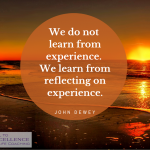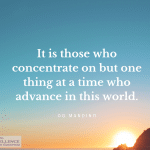
Let me start with the caveat that these are my 5 favorite books that I added to my library in 2018, not necessarily published in 2018. They’re all classics that will move you along the road to personal and professional excellence – well worth reading!
1. “One Small Step Can Change Your Life: The Kaizen Way” by Robert Maurer, PhD
It’s no exaggeration to say that this book, more than any other, did indeed change my life. Before I read it, I thought the only way to create the changes I wanted in myself and my results was through massive action – you know, go instantaneously from couch potato to exercising intensely for at least an hour every day, organize your entire home in one day, work 80 hours a week to get ahead, etc….
My repeated attempts to maintain the level of effort and willpower needed for instantaneous transformation always fizzled out, leaving me feeling like a failure. What was wrong with me? Why couldn’t I keep it together?
Turns out, there was nothing wrong with me. I was simply trying to use an approach that worked against the way my brain was wired. In fact, the massive action approach goes against the way MOST people’s brains are wired.
Robert Maurer, PhD, an Associate Clinical Professor at the UCLA School of Medicine, does a great job of explaining how any type of change triggers a fear response in one of the more primitive parts of our brain, the amygdala. This response can show up as resistance, excuses, limiting beliefs, and other forms of self-sabotage (for more on this, read my post on “Using Kaizen to Sneak Past Your Brain’s Fear Radar”).
Massive action puts the amygdala on red alert. Sirens start blaring in our brain, connections to the more rational cortex get shut down, and our brain looks for any and every way to shut down our efforts to change.
The secret, according to Maurer, is taking such small steps toward change that our amygdala stays asleep. Maurer adapts the concept of “kaizen”, meaning continuous small changes, from its original use in maximizing industrial quality and efficiency, to the process of personal change.
The effects are powerful. Small, deceptively simple changes (walking for 1 minute a day, leaving one bite of food on your plate, filing away one paper) create new pathways in our brain which pave the way for the bigger changes we desire.
Throughout the book, Maurer gives examples of how to apply this concept of kaizen, such as taking small actions to change habits (like exercising, healthy eating, getting organized), asking small questions to solve big problems, visualizing in tiny time increments to change beliefs, and using small rewards to maintain motivation.
If there’s an area where you feel like you’ve been beating your head against the wall trying to change and getting nowhere, check out this book. It really could change your life!
2. “The One Thing: The Surprisingly Simple Truth Behind Extraordinary Results” by Gary Keller and Jay Papasan
Being busy does not equal being effective. There are plenty of books and seminars on goal setting and/or time management, but all the time blocking and productivity tools in the world won’t help if you’re not focused on the right actions.
“The One Thing” by Gary Keller/Jay Papasan goes beyond even the Eisenhower Matrix (4 quadrants of important vs. urgent), by nailing what may be the most powerful question when faced with a decision about how to spend your time, or what your next step should be: What’s the ONE thing I can do such that by doing it everything else will be easier or unnecessary?
This one question cuts to the core – not just what is most important, but what is going to be MOST effective in moving you forward. While this book is considered a business book, this question can be applied in every area of life.
Gary Keller is the co-founder of Keller-Williams Realty (at the time the book came out, the #1 real estate company in the world), and Jay Papasan is VP of publishing at K-W. The book itself is a quick read – the authors distill lots of well-researched information and tips into easy-to-understand prose.
If you’re building your business or career, or want to transform your life, this book is a must read.
3. “Succeeding When You’re Supposed to Fail” by Rom Brafman
Why is it that some people seem to defy the odds and succeed beyond expectation when everything in their lives sets them up for failure? You know, the stories we love to hear about – the man or woman who comes from an impoverished, abusive background, who rises above circumstances, perseveres when everyone tells them to give up, achieves their dream, and contributes positively to the world around them?
And what’s the difference between these individuals and all the others who stay stuck in mediocrity, or worse, those who fall into a downward spiral of failure and despair? Is it simply luck? Genetics? Divine providence?
According to Brafman, a psychologist who set out to study this phenomenon of people who succeed but should by all rights fail, the answer is none of the above. These outliers (who are not as rare as you would expect) share a common set of mindsets and habits that allow them to overcome adversity.
Now, this would make for an interesting read from an academic point of view, but what’s more important is that these characteristics and strategies can be learned. We can all cultivate these traits and use them to overcome the obstacles and challenges we face in our own lives, to help us reach higher levels of success (however we each define that word).
Brafman identified 6 key traits that empower these individuals to succeed: where they focus their attention (internal or external; see my previous post on “The Limelight Effect”); discovering meaning in their circumstances; relentless commitment; having an even-tempered, easy-going disposition; having a good sense of humor; and finding a mentor or other source of unconditional positive support.
This book is based on solid scientific research, but Brafman writes in an easy-to-read style, and includes lots of fascinating stories about these unlikely achievers, as well as tips on how to cultivate these habits and strategies in our own lives.
4. “Feel the Fear…. And Do It Anyway” by Susan Jeffers
If there is something you would like to be, do, or have, but you feel like there’s something holding you back, chances are, it’s fear. It could be an underlying fear of failure, success, rejection, vulnerability, disapproval… the list of specific fears goes on and on. But according to Jeffers, the underlying grand-daddy of all fears is the fear that we can’t handle “it”.
The title “Feel the Fear… And Do It Anyway” suggests a deceptively simple and obvious solution – just do whatever it is you’re afraid of. Needless to say, if it were that easy, we’d all be out there crushing our goals and dreams.
And despite the title, that’s not what Jeffers, a PhD psychologist who has made studying fear her life’s work, means. Not exactly. Taking action IS necessary to break through our fears, but as Jeffers clearly explains, the REAL key lies in building our trust in our ability to handle whatever comes our way.
And that’s what this book is really about. Building confidence and trust in ourselves, which in turn empowers us to take action in the face of our fears.
After a few introductory chapters about fear itself, Jeffers devotes the remainder of the book to outlining practical strategies to help us build that trust. Strategies like gradually expanding our comfort zone to build our confidence muscle, reclaiming our power, shutting down the negative chatterbox in our brains, surrounding ourselves with sources of support, adopting a no-lose mindset for decision-making, and expanding the sources of meaning or satisfaction in our lives.
“Feel the Fear” is a classic for a reason. It’s probably one of the most comprehensive non-academic books on the subject, and it’s packed with actionable steps for overcoming our fears. If you feel like fear is holding you back from the life you want, check this one out.
5. “Start” by Jon Acuff
The “subtitles” on the cover of this book, “Start: Punch Fear in the Face; Escape Average; Do Work that Matters” give you a sense of Acuff’s style –a humorous yet action-oriented perspective on the pursuit of an extraordinary life. There’s a lot of practical advice, but he delivers it in a fun, light-hearted way. He takes the process of achievement (or becoming awesome, as he likes to call it) seriously, but not himself, as you’ll discover in the personal anecdotes scattered throughout the book. If you find most books on success dry and stale but you want to break free from an average life, this is the book for you.
Acuff believes we all have the capacity to be awesome, but most of us wind up on the path to average by default. We never really think about it. We get banged up by life, and people stomp on our dreams before we really test them. Settling for average is an easier, wider path with no resistance.
Fortunately, our individual roads to awesome are still out there. By making a conscious decision, we can turn off the road to average and pick the road to awesome back up at any time, no matter how old we are, or what our status is. We just need to start (and that start doesn’t have to be a huge step).
According to Acuff, there are 5 universal stages on the road to awesomeness: Learning, Editing, Mastering, Harvesting, and Guiding. Throughout the book he walks you through each stage, explaining what to expect and how to navigate the pitfalls unique to each step. At the end of the book, he includes a section with specific actions you can take, depending on which stage you’re in, to accelerate your progress toward awesome.
Acuff is full-time author and speaker, with 6 books under his belt, several of which have been New York Times bestsellers. His most recent book, “Finish: Give Yourself the Gift of Done” is already on my list of books to read in 2019.
Your Turn
I’d love to hear about what you’ve been reading too! I’m always looking for new treasures for my Bookshelf of Excellence (or, to keep it real, the stack of books under my coffee table waiting to be read J ). What books have you read that have made a big impact on your life? Share in the comments below!







2 thoughts on “Library of Excellence: My 2018 Top 5 Books on Achievement and Personal Development”
I have trouble reading self help books because I find I never want to read them when I get into bed at night and they sit there forever. I’m better with blogs and shorter format pieces.
I totally understand – the great thing is, these days there are so many other ways to get the same information – most personal development/self improvement authors have blogs and podcasts too!